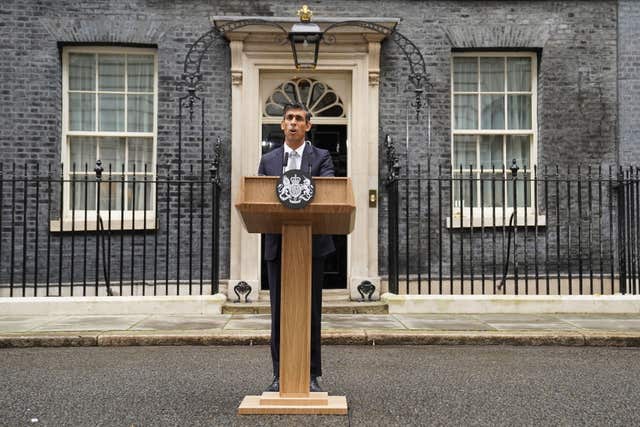Rishi Sunak urged to rethink Northern Ireland Protocol Bill at Westminster
The legislation has been likened to ‘placing a gun on the table’ at negotiations with the EU aimed at finding a solution

Rishi Sunak has faced cross-party calls at Westminster to rethink a controversial move to rip up parts of the post-Brexit deal on Northern Ireland, over warnings it breaks international law and risks a trade war with the EU.
With the new Prime Minister in Downing Street, a series of peers from across the political divide pressed for a change of heart on the Northern Ireland Protocol Bill, which has been likened to “placing a gun on the table” at negotiations with the EU aimed at finding a solution.
The Government faced demands for further details on the impact of the draft legislation before it continued its parliamentary passage through the House of Lords, where it is facing opposition.
The protocol was aimed at avoiding a hard border with Ireland but has created economic barriers on the movement of goods between Great Britain and Northern Ireland, causing resentment and anger among many unionists and loyalists.
The dispute has created an impasse in efforts to form a devolved government administration in Belfast, with the DUP refusing to return to powersharing until decisive action is taken raising the prospect of a further election.
The UK Government has vowed to secure changes to the protocol, either by way of a negotiated compromise with the EU or through proposed domestic legislation that would empower ministers to scrap the arrangements without the approval of Brussels.
Critics have argued the Bill represented a “sword of Damocles” over the talks, broke international law and damaged the UK’s global standing.
Relations between the UK and EU appeared to have improved since Boris Johnson left office and both London and Brussels have been talking up the potential for striking a deal through a fresh round of negotiations.
Tory former leader Lord Howard of Lympne said: “There’s agreement across the House that the best solution would be an agreement between the United Kingdom and the European Union. We are told that discussions are taking place. I hope the new administration will give fresh impetus to those discussions.”
Labour former Northern Ireland secretary Lord Hain argued finding a solution to the protocol was “easy” compared to previous agreements reached in Northern Ireland.
He said: “This problem is eminently soluble by serious negotiations, give and take and understanding of the different interests at stake.
“We need less dogma, more flexibility and this Bill is getting in the way of that.”
Tory former minister Baroness Altmann said: “The problems of this Bill are far deeper and more fundamental and more important than Brexit. This is about right and wrong.”
She added: “This Bill risks upsetting our trading relations with the EU and indeed the US at a time when we need them to boost growth.
“The new Prime Minister has a chance to reconsider this Bill and set it aside in the interests of growth. I hope he will decide at the very least to put it on hold so that proper negotiations can take place and trust restored.”
Former European commissioner and Tory Cabinet minister Lord Patten of Barnes also urged a rethink.

Labour frontbencher Baroness Chapman of Darlington branded the Bill “reckless and unworkable” .
She said: “Surely any incoming Prime Minister would want to demonstrate an ability to resolve problems rather than prolong them?”
Independent crossbench peer Baroness O’Loan told the upper chamber that the Bill had been compared to “placing a gun on the table at the negotiations”.
She said: “I hope even at this late stage the Prime Minister… will consider the matter further and withdraw the Bill.”
Former deputy leader of the Democratic Unionist Party (DUP) Lord Dodds reiterated his party’s opposition to the protocol.
He added: “It’s not incompatible to support this Bill and to seek a negotiated outcome.”
Responding for the Government, Foreign Office minister Lord Ahmad of Wimbledon said: “It is our view, of the Government, that we need to progress this Bill now to fix the practical problems that have been highlighted.”
Pointing out talks were taking place with the EU, he added: “We are continuing to engage and have those constructive exchanges.”





